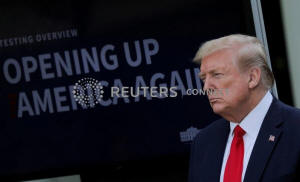Trump, U.S. House face off in court over subpoena power
 Send a link to a friend
Send a link to a friend
 [April 28, 2020]
By Jan Wolfe [April 28, 2020]
By Jan Wolfe
WASHINGTON (Reuters) - A U.S. appeals court
will hear arguments on Tuesday in a historic dispute between the Trump
administration and the U.S. House of Representatives over how much power
Congress has to enforce subpoenas demanding testimony or documents.
Holding oral arguments by phone, the U.S. Court of Appeals for the
District of Columbia Circuit will consider whether a House committee can
sue to enforce a subpoena for testimony from former White House Counsel
Donald McGahn.
A divided three-judge panel of the court ruled for President Donald
Trump in February, saying the court had no place in settling the closely
watched dispute between the executive and legislative branches of the
U.S. government.
The court said that nine of its 11 judges would reconsider that ruling.

Two judges who were appointed by Trump to the court, Neomi Rao and
Gregory Katsas, have said they will not participate, likely because both
previously worked in the Trump administration.
The Democratic-led House Judiciary Committee has said the earlier 2-1
ruling upset the balance of powers created by the U.S. Constitution.
The committee had sought testimony from McGahn, who left his post in
October 2018, about Trump’s efforts to impede former Special Counsel
Robert Mueller’s investigation that documented Russian interference in
the 2016 U.S. election.
McGahn declined to testify before the committee after the Trump
administration advised him to defy the subpoena. The Justice Department,
arguing for the administration, has argued in court that senior
presidential advisers are “absolutely immune” from being forced to
testify to Congress about official acts and that courts lack
jurisdiction to resolve such disputes.
[to top of second column]
|

President Donald Trump attends a coronavirus response news
conference in the Rose Garden at the White House in Washington,
U.S., April 27, 2020. REUTERS/Carlos Barria

The standoff over McGahn's testimony "was a fairly common
information dispute between Congress and the executive branch — the
kind that will recur over history," said Andrew Wright, a lawyer at
K&L Gates who advises on congressional investigations.
The February decision, if embraced by the full D.C. Circuit, would
significantly weaken Congress' investigatory powers, Wright said.
If that happens, lawmakers may consider reviving "inherent
contempt," a dormant, extrajudicial power to arrest, detain and fine
that Congress has not used since the 1930s, Wright said.
The court is to consider the McGahn case alongside another dispute
between the House and the Trump administration.
In that case, the House sued over Trump’s announcement that he would
spend $8.1 billion on a wall on the U.S.-Mexico border despite the
fact Congress had only appropriated $1.375 billion. The case raises
similar issues to the McGahn case, with a district court judge
ruling that the House did not have standing to sue.
(Reporting by Jan Wolfe; Editing by Peter Cooney)
[© 2020 Thomson Reuters. All rights
reserved.] Copyright 2020 Reuters. All rights reserved. This material may not be published,
broadcast, rewritten or redistributed.
Thompson Reuters is solely responsible for this content.
 |